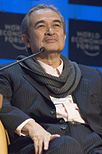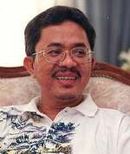- Malaysian general election, 2004
-
Malaysian general election, 2004 
1999 ← 21 March 2004 → 2008 All 219 seats in the Dewan Rakyat
and all state legislature seats in 12 (out of 13, except Sarawak) states of MalaysiaFirst party Second party Third party 


Leader Abdullah Ahmad Badawi Lim Kit Siang Kamaruddin Jaafar Party BN DAP Barisan Alternatif Leader since 31 November 2003 21 September 2001 2003 Leader's seat Kepala Batas Ipoh Timur Tumpat Last election 147 10 42 (32 at dissolution) Seats won 198 12 8 Seat change  51
51 2
2 24
24Popular vote 4,420,452 687,340 1,668,998 Percentage 63.9% 9.9% 24.1 Swing  7.37
7.37 4.69
4.69 16.13
16.13
Prime Minister before election
Prime Minister-designate
Malaysia 
This article is part of the series:
Politics and government of
Malaysia
General elections were held in Malaysia on March 21, 2004. The incumbent National Front government of Prime Minister Dato' Seri Abdullah Ahmad Badawi was re-elected with an increased majority.
Contents
Election results
The National Front gained a popular vote of 63.9%, but would have gained a higher vote had all seats been contested. Reports in the Malaysian media on March 23 showed the Front winning 198 parliamentary seats to the combined opposition parties' 20 seats, with one independent. This is the largest majority that National Front has won since the 1978 elections.
The dominant party in the National Front, the Prime Minister's United Malays National Organisation (UMNO), won 109 seats, a gain of 32. UMNO's allies also gained seats. The Malaysian Chinese Association won 31 seats, a gain of two, and the Malaysian Indian Congress won nine seats, a gain of two.
Islamic Party of Malaysia (PAS) managed to retain only seven of its 27 seats. PAS ran on a platform promising an Islamic nation. The PAS opposition leader, Datuk Seri Abdul Hadi Awang, lost his parliamentary seat.
Another opposition party, the People's Justice Party (Parti Keadilan Nasional) lost four of its five seats. After five recounts the party's leader, Datin Seri Dr Wan Azizah Wan Ismail (the wife of imprisoned former Deputy Prime Minister Datuk Seri Anwar Ibrahim), retained her seat with a majority of 590 votes.
The third opposition party, the Democratic Action Party, which was routed in the 1999 elections, improved its performance with the re-election of party chairman Lim Kit Siang and his deputy, Karpal Singh. The DAP won 12 seats and regained the official leadership of the opposition in the national parliament from PAS.
Most candidates who campaigned on platforms of Islamic issues lost their seats. This is a significant turnaround since the last election where, generally, the more "Islamic" candidates had a greater chance of winning in the Malay heartland.
Table of results
Summary of the 21 March 2004 Dewan Rakyat (House of Representatives) election results Votes % of vote Seats % of seats +/- National Front (Barisan Nasional): 4,420,452 63.9 198 90.4 +51 United Malays National Organization (Pertubuhan Kebangsaan Melayu Bersatu, UMNO) 2,483,249 35.9 109 49.8 +38 Malaysian Chinese Association (Persatuan Cina Malaysia, MCA) 1,074,230 15.5 31 14.2 +2 Malaysian Indian Congress (Kongres India Se-Malaysia, MIC) 221,546 3.2 9 4.1 +2 Malaysian People's Movement Party (Parti Gerakan Rakyat Malaysia, Gerakan) 257,763 3.7 10 4.6 +4 United Traditional Bumiputera Party (Parti Pesaka Bumiputera Bersatu, PBB) 383,664 5.5 11 5.0 +5 Sarawak United People's Party (Parti Rakyat Bersatu Sarawak, SUPP) 6 2.7 Sarawak Progressive Democratic Party (Parti Demokratik Progresif Sarawak, SAPP) 4 1.8 United Sabah Party (Parti Bersatu Sabah, PBS) 4 1.8 United Pasokmomogun Kadazandusun Murut Organisation (Pertubuhan Pasok Momogun Kadazandusun Bersatu, UPKO) 4 1.8 Sabah Progressive Party (Parti Maju Sabah, SAPP) 2 0.9 United Sabah People's Party (Parti Bersatu Rakyat Sabah) 1 0.5 People's Progressive Party (Parti Progresif Penduduk Malaysia, PPP) 1 0.5 Liberal Democratic Party (Parti Liberal Demokratik, LDP) Democratic Action Party (Parti Tindakan Demokratik, DAP) 687,340 9.9 12 5.5 +2 Alternative Front (Barisan Alternatif) coalition: 1,668,998 24.1 8 3.7 -24 Islamic Party of Malaysia (Parti Islam SeMalaysia, PAS) 1,051,480 15.2 7 3.2 -20 People's Justice Party (Parti Keadilan Rakyat, PKR) 617,518 8.9 1 0.5 -4 Non partisans (and others) 139,438 2.1 1 0.5% -2 Overall total 6,916,138 100.0 219 100.0 +26 Source: The Star, Kuala Lumpur State elections
Elections for the assemblies of all the Malaysian states except Sarawak were also held on March 22. The National Front and its allies won majorities in all states except Kelantan where, despite earlier reports to the contrary, PAS retained control with a narrow majority of 24 seats to BN's 21 seats. The National Front regained control of the state of Terengganu, which it lost to PAS in 1999. The PAS opposition leader, Datuk Seri Abdul Hadi Awang, who lost his parliamentary seat as mentioned earlier, managed to retain his state seat.
Background
On March 2, the 10th national parliament and all state assemblies in Malaysia (with the exception of Sarawak) were dissolved by the Yang di-Pertuan Agong upon the advice of the Prime Minister. Sarawak's last state election was held in 2001, and elections for the state assembly are not due till 2006.
The election was held nine months earlier than required by the constitution. The constitution allows that parliament has a mandate of 5 years. Elections are required to be called three months after parliament is dissolved. The government had until the end of November 2004 to call elections.
Candidates nominated on March 13, with the National Front winning 15 seats uncontested, and another two seats after the opposing candidates withdrew. The right to withdraw was only introduced as a new rule at these elections. Under this rule candidates are allowed a three day period to withdraw following nomination day. Of the 17 parliamentary seats won uncontested, nine were in the state of Sabah, six in Sarawak and two in Johor.
PAS won a state assembly seat in Johor for the first time, after the National Front candidate was disqualified because she was seconded by someone who was not a registered voter in the constituency which she wanted to contest. The requirement that the seconder be registered in the same constituency was only introduced in 2004.
Election irregularities
The elections were marred by discrepancies, which were admitted by the electoral authorities. The head of the Election Commission (Tan Sri Abdul Rashid Abdul Rahman) made the statement "I have been in this line for so long... it should not have happened at all. There must be reasons why this happened." He has served in the election commission for the last five elections, and has stated that he intends to resign if a report on the discrepancies implicates him in the foul-ups.
Among the discrepancies were wrongly printed ballots, registered voters being unable to vote and wide discrepancies in votes in various seats upon re-counting the ballots.
A re-election was held in the seat of Sungai Lembing (Pahang), since the wrong party symbol was printed on the ballot paper for the opposition candidate. Illiterate voters tend to rely on familiar party symbols for voting purposes as they are unable to read the candidate's names on the ballot.
References
See also
- Elections in Malaysia, for an overview of Malaysian electoral processes and general, state and by-elections.
- Parliament of Malaysia
- History of Malaysia
External links
- The (Malaysian) Star Online
- ChannelNewsAsia
- Bernama
- Election Commission Malaysia (SPR) (Malay)
- Results from the SPR (Malay)
 Elections in Malaysia
Elections in MalaysiaGeneral elections Categories:- 2004 elections in Asia
- 2004 elections in Malaysia
- 2004 in Malaysia
- General elections in Malaysia
Wikimedia Foundation. 2010.
